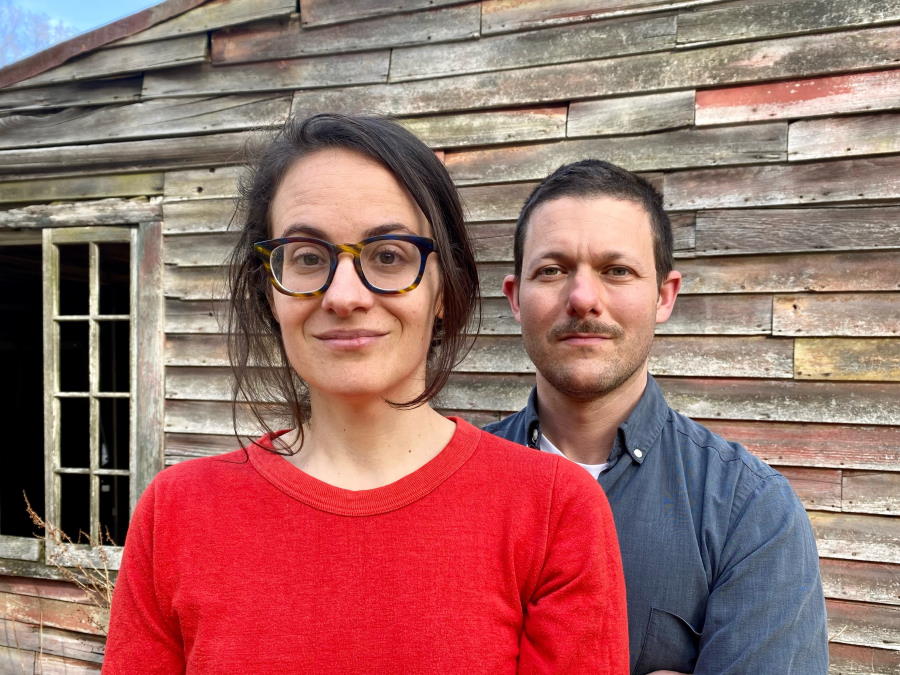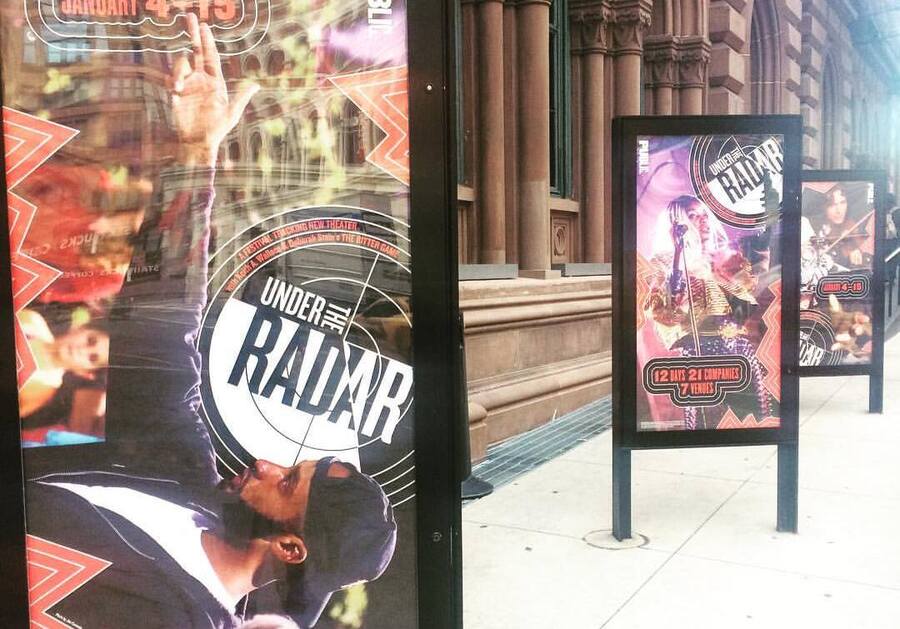When the Public Theater announced its 2023-24 season last week, it omitted the Under the Radar Festival (UTR) from its slate for the first time since 2006. The theatre’s decision to cease hosting the festival—which each January has presented experimental, avant-garde, and international works—has been met since with widespread backlash from artists and critics across social and traditional media.
Speaking to The New York Times, Oskar Eustis, the Public’s artistic director since 2005, called the end of UTR at the Public “entirely a financial decision.” A June 2 Playbill article about the announcement included a further clarification, in which a Public spokesperson stated that the theatre had not canceled the festival, but had placed it on “extended hiatus.”
“That’s not how it was characterized to me,” Mark Russell, the longtime director and producer of the festival, told American Theatre in an interview. “It’s really an end—unless someone dropped a whole lot of money on them.” (The Public did not respond by our June 6 deadline to a request for further comment; below is a full statement from Eustis that American Theatre received on June 7.)
Under the Radar was known for producing smaller works, including one-person shows, as well as out-of-the-box “downtown theatre, experimental theatre, God knows what it really is,” Russell said of the festival’s offerings. “I just call it good theatre, but then no one takes my explanation.”
UTR pivoted to a mostly digital format in 2021 in the wake of COVID, then canceled planned live programming in 2022 due as the Omicron variant spread. This past January saw the festival return to in-person performances at the Public and multiple other venues, including La MaMa and the Brooklyn Academy of Music. As in the past, the Public was the festival’s producer, but served as the presenter, not the producer, of individual shows, whose creators raised money to cover most of their costs. Russell, for his part, was in charge of wrangling venue fees and visa costs for international performers, which the Public picked up the tab for but which have skyrocketed in recent years.
“What I would pay normally in a fee, I’m paying first of all in a visa, to get you over here to pay my fee,” Russell said of the process, which grew more complicated due to both COVID and Trump administration policies. “That’s where it triples in costs.”

Still, Russell said, UTR stuck to its budget and was not a drain on the Public’s resources (the theatre boasted a $47.4 million budget as of 2021). “We try not to be a burden on the organization,” Russell said, adding that if the UTR team anticipated a show wouldn’t hit its income target, “we would save it on the technical side.”
The festival attracted many do-it-yourself pieces. In 2023 alone, UTR produced puppetry shows, cabarets and song series, standup comedy, and devised theatre pieces, among others. The brochure for this year’s festival, available on the Public’s website, describes UTR as “a landmark of the New York City theatre season” and “a vital part of The Public’s mission.”
Abigail Browde and Michael Silverstone, the duo behind 600 Highwaymen, have presented work at UTR since 2014, and credit the festival with helping them “create conversations and relationships that we’re still building today,” as Browde put it. In 2021, frustrated that digital theatre didn’t require the same immediacy of focus from audiences, 600 Highwaymen presented A Thousand Ways at UTR. This performance series asks audience members to connect through a live phone call; 600 Highwaymen presented a third part at this year’s UTR.

Browde and Silverstone are proud of the work they produced at UTR, but are more grateful that Russell’s model gave them time and space to dedicate to their craft. After all, they work in a less commercially viable medium in an already unstable field in one of the most expensive cities in the country, where rehearsal and studio space isn’t easy to find. “How does anyone live here, let alone have space to experiment?” Browde wondered when thinking about the future of UTR and the duo’s work.
Like Russell, Browde and Silverstone reject the term “experimental theatre” as both broad and reductive, and a symptom of the American theatre’s hyper-categorization problem. “Is it this kind of theatre, is it that kind of theatre?” Browde said. “Is it dance theatre, or is it downtown experimental avant-garde theatre?” UTR exposed the duo to artists and arts-making philosophies from Europe and elsewhere who don’t adhere to strict categories when they create, or feel pressured to do so when they market their work.
“I don’t want to say we’re going to need experimental theatre, because I don’t like that term at all, because it’s a box,” Silverstone said of the future of American new-works festivals. “But we’re gonna need experimenters and innovative thinkers. We’re going to need those people more than we’re going to need Alicia Keys,” he added, referring to the musician’s bio-jukebox musical Hell’s Kitchen, to premiere at the Public in the fall.
Russell hopes to be part of the next initiative that those experiments and innovators create, though he is also tempted by the prospect of retirement. “I’m excited about the possibilities of different festivals,” Russell said, having just returned from circuits in Belgium and the Netherlands. “I think New York City needs a theatre festival that addresses these more small-scale works, more edgy works, that are around the world.”
The end of UTR doesn’t spell the end of all DIY or experimental theatre in New York: We still have new works labs like The Tank and festivals like Exponential, among others. But the Public’s decision does mark the end of a unique partnership between a prestigious resident theatre and the work of smaller, edgier artists and ensembles. Browde and Silverstone worry about who might be left behind and unrecognized if other cultural institutions don’t provide similar time, space, and funding for working artists.
“When I wake up at four in the morning and I’m thinking about this, I’m thinking, how is the next generation of theatremakers…” Silverstone cut himself off. “We’re going to need them now more than ever.”
UPDATE: A full statement from Public Theater artistic director Oskar Eustis appears below:
Last week, difficult news was shared that the Under the Radar festival would not return for The Public’s 23-24 season. We made the painful decision to place the festival on hiatus. I understand and share the hurt that those who participated in and loved the festival have expressed over the past few days.
The Public Theater has been the proud home of Under the Radar for 18 years. Under the brilliant leadership of Mark Russell, UTR became a beloved annual part of our city’s calendar, a time when we celebrated the cutting-edge performance art of the moment. It was also a vital gathering point for adventurous artists and audiences and the only place in our season where American and international artists work side by side in multiple venues. My first artistic act when I became artistic director was to invite UTR to make The Public its home.
Unfortunately, these are exceptionally challenging times in our field. The Public, like almost every other nonprofit theatre in the country, is facing serious financial pressure. We have not returned to pre-pandemic economics, neither in our expenses nor our revenue. Many of our programs are free or priced for accessibility, which make them particularly economically vulnerable. Because of these factors, we are assessing and implementing other cost reductions at the theatre in addition to UTR. We must act now to avoid the kind of existential pressure currently battering some of our sister theatres.
The Public retains its strong commitment to experimental, devised, and downtown work outside of a festival context, including the Devised Theater Working Group, our incubator for experimental artists. Further, Joe’s Pub continues to be a platform for many multidisciplinary artists; and we will continue our long-standing relationships with experimental ensembles. We will be aggressively searching for ways to support the artists who thought of UTR as home.
In the certainty that better times will come, we continue to work to preserve the health and mission of The Public. We look forward to a time when we can fully expand back into the robust and expansive theatre we need to be.
Correction: This article initially stated, incorrectly, that the Public was the presenter, not the producer, of the Under the Radar festival.
Amelia Merrill (she/her) is a journalist, playwright, and dramaturg. A contributing editor at American Theatre,her work has been featured in Mic, Hey Alma, Narratively, and more. @ameliamerr_


